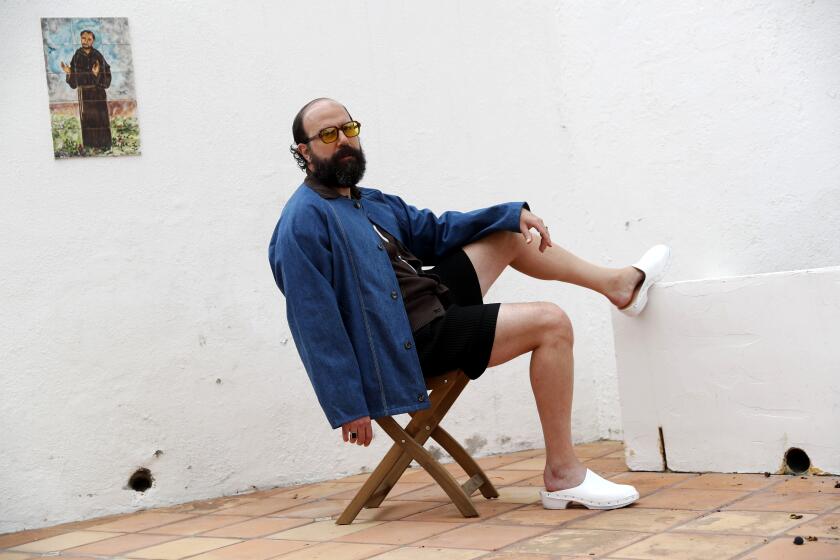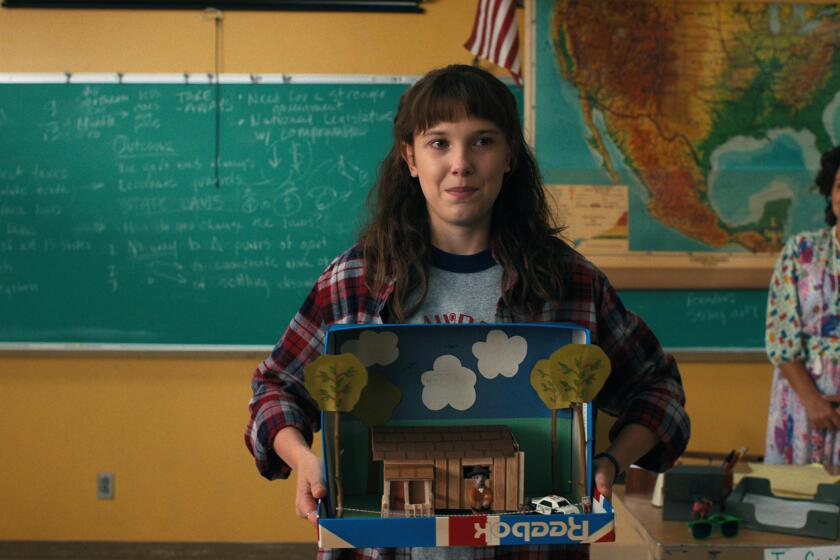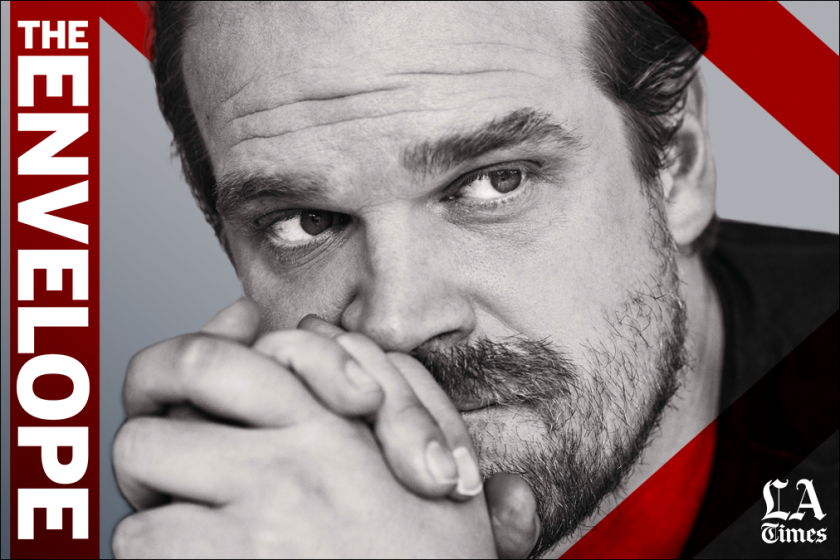‘Stranger Things’ star Joseph Quinn breaks down Eddie Munson’s fate
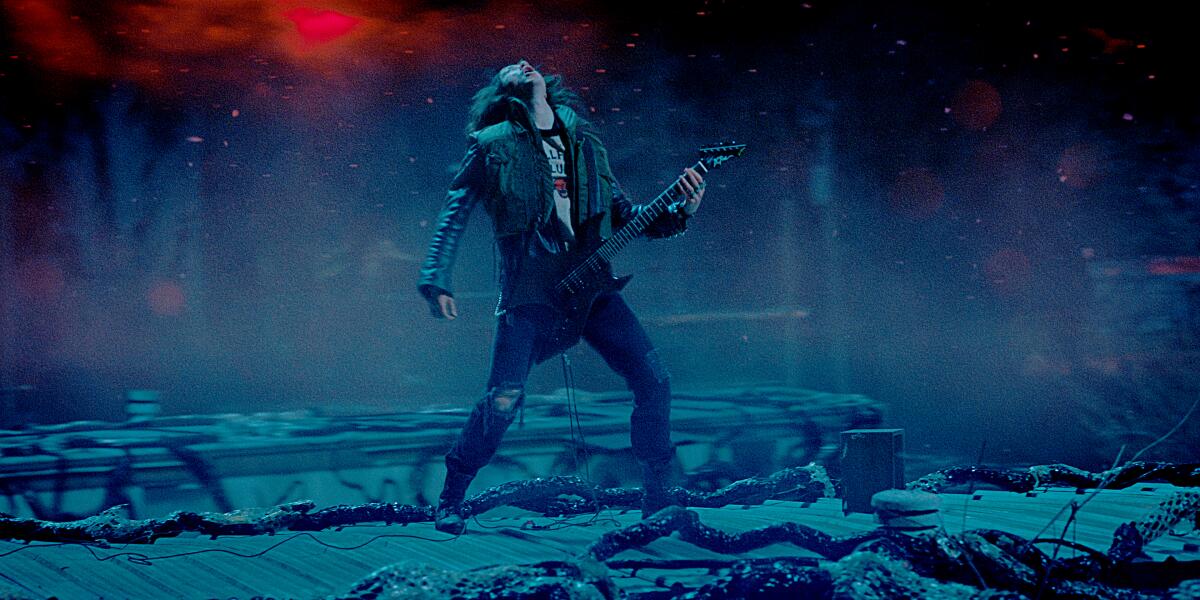
- Share via
The newest addition to “Stranger Things” arrived in Season 4 of Netflix’s sci-fi/fantasy series with the intensity of a 10-ton Metallica riff when Eddie Munson jumped on a table in the Hawkins High cafeteria and proclaimed that forced conformity was “the real monster!”
It was clear then that Munson, played by Joseph Quinn, was a different sort of misfit among the other ‘80s-era AV club nerds we’ve come to know and love since the series debuted six years ago. The intense leader of the Dungeons & Dragons-obsessed “Hellfire Club” is an avid (and appropriately long-haired) heavy metal fan. A stoner who’s repeated 12th grade more times than anyone can remember. And his Slayer-meets-”Wayne’s World” fashion sense promises to be the inspiration for one of 2022’s most popular Halloween costumes.
Now‘s the time to stop reading if you have not finished the entire fourth season of “Stranger Things,” the final two episodes of which premiered Friday — because there are major spoilers ahead. And Munson, who is called a “loser” and demonized by many in his Indiana small town, plays a critical role in fighting the show’s true villain, Vecna. British actor Quinn spoke to The Times about the wig he wears to play Eddie, what it’s like to fight a swarm of demobats with a broom and Munson’s fate in the season finale of the Duffer Brothers’ blockbuster. The following has been edited for clarity.
After being written off, Brett Gelman built an impressive career as a character actor. Now, in Netflix’s sci-fi blockbuster, he’s giving a star turn.
Were you invested in “Stranger Things” before you signed onto the series?
Joseph Quinn: I was, like everyone, completely charmed by it. It was very surreal to be asked to participate in it. I think every actor can kind of relate to that email in your inbox that feels totally insurmountable and unlikely. Like it’s never going to happen. I had no expectations to hear anything back when I sent the tape off. Then they asked me to do another one. And I sent another tape off, and I got the offer. It’s still baffling to me today that I got asked to come and have this most surreal ride of my life in a brilliant TV show.
Eddie Munson is into all the things that set off the satanic panic of the 1980s — D&D, heavy metal, recreational drugs. It was a time when the religious right was blaming all manner of crimes on devil worship. Most famously, the West Memphis Three were wrongly accused, convicted and imprisoned for murdering three boys as part of a Satanic ritual.
I think using Eddie as a vehicle for that storyline, it enriches the [narrative] and it feels authentic — well as authentic as “Stranger Things” can be. As the audience, we expect to be put off by him somehow, to find him menacing, but you actually start to feel a bit sorry for him. Poor, poor thing, as my grandmother would say. He’s just in a tight spot, really.
But when we’re introduced to Eddie in Volume 1, he is so zealous and wild-eyed he exudes bad-guy potential.
That first scene where you meet him, he’s so ostentatious ... so provocative, attention-seeking and in your face. If you’re a person that doesn’t respond well to that, you’re going to be allergic. I felt like, “That’s going to be difficult for audiences to accept and like this person.” But it’s a testament to the brilliant writing that the [Duffer] Brothers had in place, because the next time that we meet him, it’s this quite tender moment with [classmate] Chrissy and you get a very different side to him. You see the antithesis of this character in the first episode. They wrote it so empathetically, and it was so savvy in playing with archetypes, especially high school archetypes.
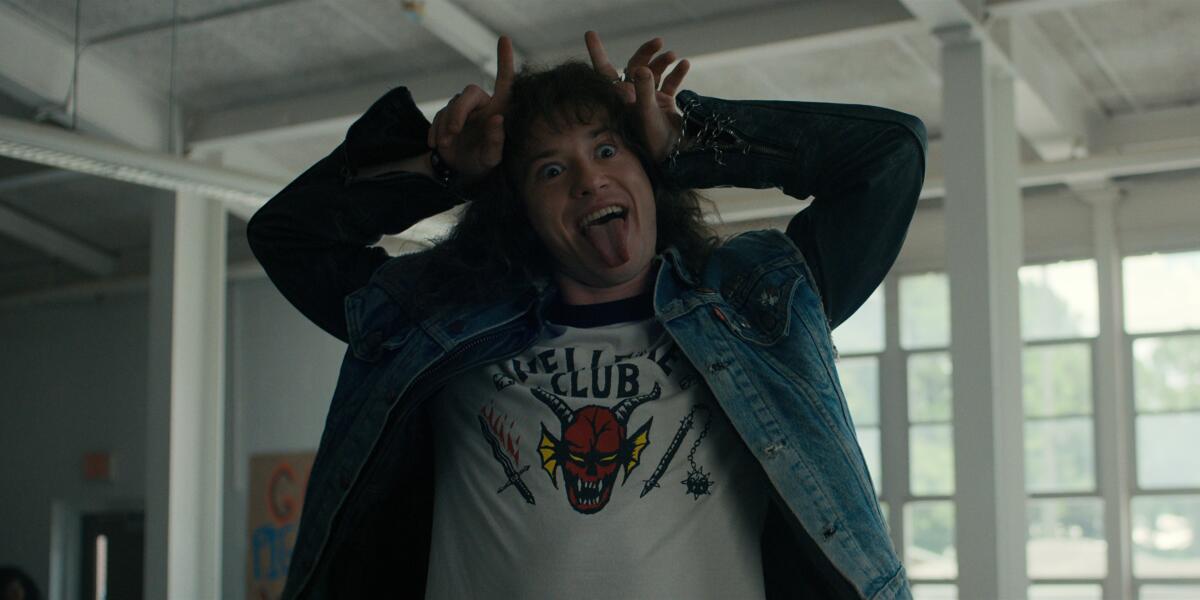
He’s also a reminder that outcasts aren’t just AV club nerds. They’re also kids set apart by their socioeconomic status — Eddie lives in a dilapidated trailer — their possible learning differences, and their lack of opportunity.
Absolutely. And camaraderie is a valuable theme for this season of the show and in times of adversity in all of our lives. We need friends, whether it’s to help us through the tricky part of a breakup or defeating Vecna.
We all have our own Vecnas, don’t we? Enemies who torture us telepathically.
They’re around every corner.
The high school archetypes in England may be different than they are here, but who were you in high school?
I was a drama nerd who loved acting. I also tried to be friends with everyone. So I guess I’ll say I was weird? Yeah, a bit of a weirdo. Bit mouthy. Spoke too much.
The oft-nostalgic Netflix series succeeds in Season 4 by treating adolescence as the torturous experience it is for those who don’t fit in.
You’ve played wonderfully diverse roles in “Dickensian,” “Howard’s End,” “Catherine the Great.” And those productions are also very different from one another. It’s a testament to your versatility and range.
I really don’t have any choice. You have to have a pretty passive relationship with your destiny in this kind of game because you have such little control over anything. Especially in those first few years. You have to take what you’re given and if you have the luxury of saying no, you say no. But I feel very grateful for the kind of the roles I’ve been given so far. You just try to [approach] it in a way that feels authentically from you and feels like an interesting portrayal.
How much did you know about Eddie’s fate when you were offered the part?
I remember Skyping with the brothers before I signed on, and they weren’t giving away very much. They sent me a couple emails asking if I played guitar and I said yes I did. Then they sent the script over and I kind of imploded and went to go buy a guitar as soon as I could and started practicing.
In the final episode of Volume 2, Eddie practically gets his own metal video. He’s standing on top of the trailer in this hellscape, shredding Metallica’s “Master of Puppets” on his V-shaped guitar. It’s so perfectly of-the-period and so wonderfully “ST4.”
It’s insane. It’s doing so many things. I think this is the only world in which something like that can happen and it doesn’t feel like a pastiche. It doesn’t feel forced. And hilariously, it doesn’t feel melodramatic. It just feels right. And more than anything, it just feels fun. It’s that energy through that whole kind of ridiculous sequence that brings all of these storylines together. That crescendo was just so inventive and ultimately so entertaining.
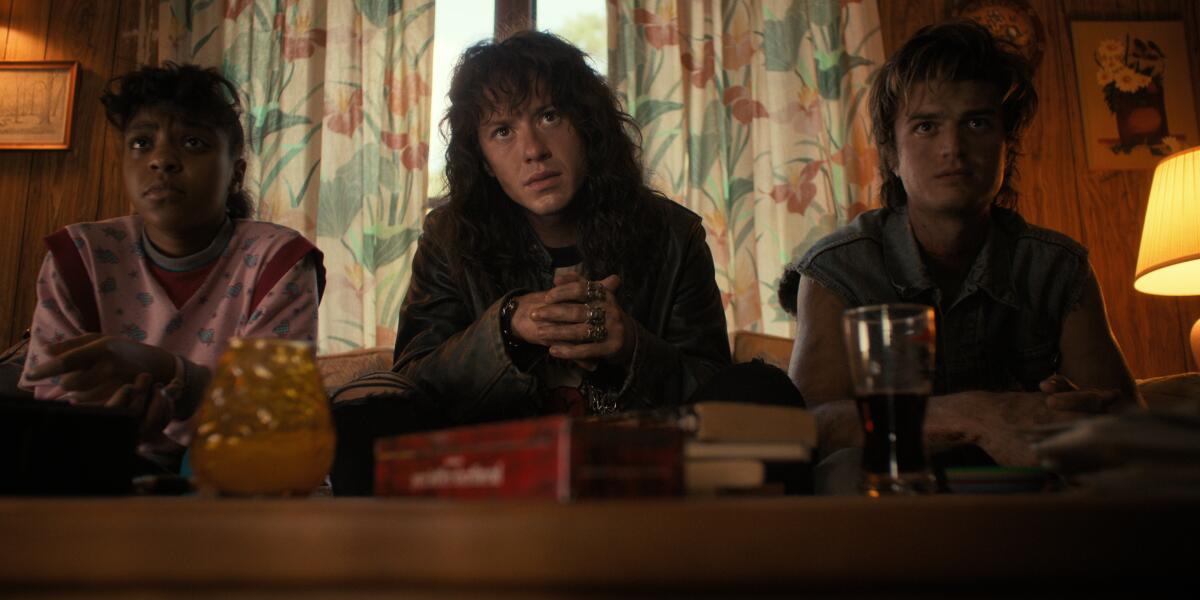
When you were fighting those bat things …
I think they’re called demobats. And some had individual names but I didn’t ask [who was who].
Because you were too busy killing them off with a broom and a trash can lid.
It was a weird day at work.
What was actually coming at you when you were shooting those scenes?
Nothing. It was so funny. You get these hilarious instructions from Matt and Ross, like “... and bat! And bat! And broom!” They’re shouting “bat!” at you at you have to pretend there’s a bat there. But that kind of carried throughout the whole thing. You’d hear “... and broom! And coffee!” If you zoomed out at any point during the filming of the show, you’d think: This is a weird life. But a great one.
‘Stranger Things’ star David Harbour discusses Hopper’s transformation, his own mental health journey, and ‘Black Widow’ parallels.
Do people recognize you now from your work in “Stranger Things”?
Yes, definitely. I think I was only recognized maybe five or six times in my life before this show came out. It’s a very big show and for a lot of people their first introduction into what I’m doing is Eddie, particularly with a younger demographic. It’s a privilege, but it’s very weird. It’s going to take some adjustment.
I’m surprised they spot you without the big hair and the “Hellfire Club” jacket.
Yeah, I thought that was going be a proper kind of [disguise]. I think if I was walking around with the wig on, which I only do on weekends, it would be a bit worse, but it’s OK … My friends say they’re very looking forward to Halloween.
Oh dear. They’re going to taunt you. What are you going to do for Halloween?
Probably get out of South London. There’s going to be a gaggle of Munsons around here.
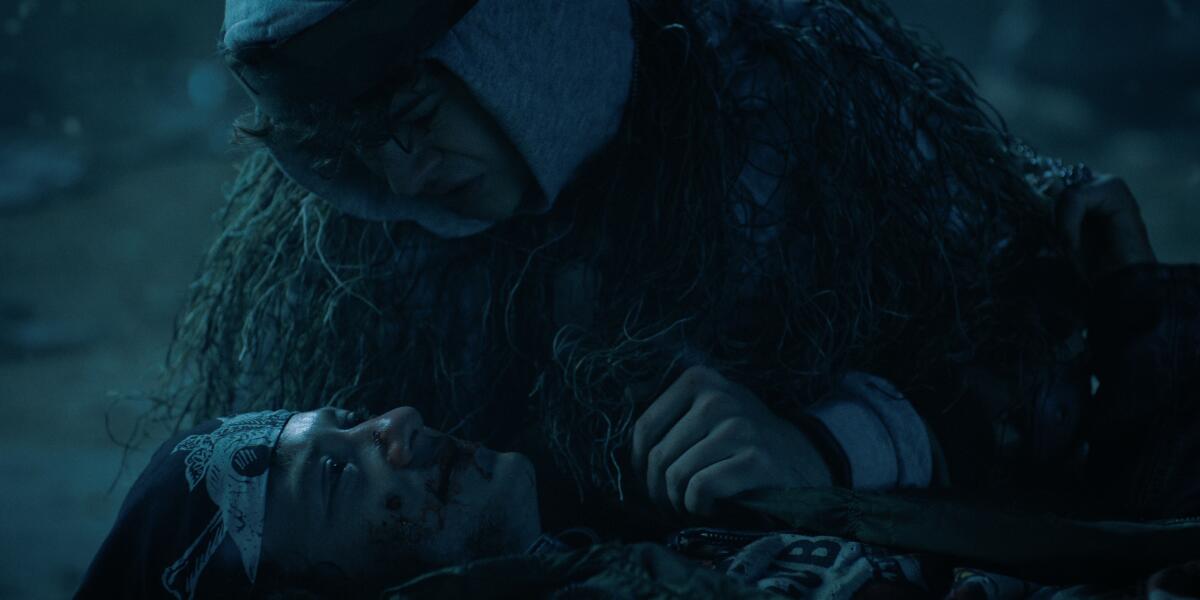
I’m saving this part for the bottom of the story because it’s a spoiler, and it makes me sad. Eddie is the only sympathetic character that gets killed off. I’m upset!
Jason goes in the last episode as well.
But he was a jerk. He needed to die.
He was so brilliantly played by Mason Dye. But yeah, Eddie’s the one who bites the dust.
Are you braced for the collective mourning over Eddie’s demise?
I’ve been texting the Duffers intermittently during the hiatus period and yeah, we’re bracing ourselves. There’s a beginning, middle and end to every character’s arc and I feel incredibly touched by the reception that Eddie’s gotten, how inviting they’ve been. There’s a lot of devotion toward the show and its characters. I think about characters that I loved when I was growing up and now to think that someone out there feels like that about a character that I played is a kind of mental thing. It’s humbling and something I never expected to feel.
Any last words for those mourning Eddie?
Thank you for having him while he was here.
More to Read
The complete guide to home viewing
Get Screen Gab for everything about the TV shows and streaming movies everyone’s talking about.
You may occasionally receive promotional content from the Los Angeles Times.
